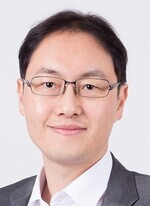hankyoreh
Links to other country sites 다른 나라 사이트 링크
[Guest essay] Dogmas and complexes hindering S. Korean progressives


On the first page of the Hankyoreh delivered to my home on Dec. 19, 1997, the headline read “Kim Dae-jung elected president” in big letters. It was a day on which political power was turned over peacefully for the first time in the history of South Korea, a moment when the progressive political paradigm that had lingered in the margins of South Korean society finally ascended to the mainstream.
During the next 25 years, an astonishing era of progressivism unfolded. Innovations continued in inter-Korean relations, welfare, education and economics. Even the conservative camp accepted the progressive paradigm to a certain extent.
But now, the progressive paradigm is being considered antiquated. Why? Could this phenomenon have arisen because progressives have held fast to rigid dogmas that were right 25 years ago but are no longer?
Five dogmas of the progressive camp immediately come to mind.
First, the dogma of nuclear phase-out. The anti-nuclear movement propelled nuclear phase-out into a mainstream progressive principle by combining the anti-Americanism of the 1980s and the environmentalism that followed. But it’s now undeniable that nuclear plants emit less carbon than fossil fuels while also having more stability than renewable energy. Considering this, shouldn’t nuclear plants and renewable energy join forces and form an alliance for carbon neutrality?
Second, the Sunshine Policy dogma. Unlike 25 years ago, North Korea is currently a de facto nuclear power. The sunshine may be able to persuade the wanderer to take his jacket off, but it won’t be able to take the grenade out of his pocket. Shouldn’t progressives accept “long peace amid tensions” as a realistic goal and reconsider the tenor of their North Korea policy, then?
Third, the dogma of egalitarian education. Because the progressive policy keynote opposes competitive education, “excellence” has become a taboo word in progressive education. But while excessive competition is a problem, it would be a bigger problem if trying to alleviate competition resulted in poor competitiveness. New births numbered 640,000 in 2000, but last year, they were at 260,000. Our children must develop the ability to carry our society forward despite their fewer numbers. That being the case, shouldn’t progressives consider whether an “education of excellence for all” that’s creative and collaborative while also being capable of building competence is now more necessary than ever?
Fourth, the dogma of decentralized power. Although progressives took initiative to decentralize power, imperial mayors and governors, as well as civil servants, were ultimately the ones granted those powers instead of local residents. At the nation’s center, the president must beg Samsung for investments, but in the provinces, merchants survive by begging their governors for assistance. This is why former lawmakers run for mayor, governor, and district mayor — posts that were looked down on in the past. Perhaps now is the time to pause efforts to expand local governments’ authority and design a new political structure that can truly empower local residents to govern themselves?
Fifth, the dogma of expanding the public sector. The progressive stance has been that the government has to get bigger in order to check the market. As a result, South Korea has become a nation run by innumerable government agencies and supporting organizations that manage and supervise the private sector. Even though they are always short-staffed, agencies face snowballing administrative and auditing duties day by day. Shouldn’t the reform of the public sector finally be set as a progressive agenda?
Meanwhile, progressives have oftentimes been hesitant to practice their foundational values due to several stereotypes.
The “commie stereotype” is a big one. Whenever discussions about radically expanding social security such as through universal basic income occur, a good number of “so-called progressives” worry about being attacked for “wasting taxpayer money” first and foremost. When progressives were criticized for their failed real estate policy, they rushed to reduce taxes before even properly determining why their policy failed. Such a response derives from the fear progressives have of being called socialists for advocating for more government spending or increased taxes — a point of view that’s still mired in the past, when people were accused of being communists for fighting for democracy.
The stereotype that progressives don’t understand economics is also a huge problem. There were many “so-called progressives” who said the government’s proposal on how to accomplish carbon neutrality was “unrealistic” because “corporations were against [it].” But today’s progressives exist to fight inequality and the climate crisis. Passengers can accept a driver changing his route with flexibility. But if he changes his destination, the passengers will have no choice but to bail.
What has resulted because progressives forgot their destination due to self-consciousness about stereotypes surrounding them is pitiable to see. The predominant view is that despite our society having undergone an era of progressivism, we can’t be further from solving the climate crisis and inequality. Progressives should remember where they’re headed while flexibly resetting their route and coming up with a new policy paradigm. Without bold change, the era of progressivism may come to an end. I look forward to the birth of a new progressivism that will guide us through the next 25 years.
Please direct questions or comments to [english@hani.co.kr]

Editorial・opinion
![[Column] Season 2 of special prosecutor probe may be coming to Korea soon [Column] Season 2 of special prosecutor probe may be coming to Korea soon](https://flexible.img.hani.co.kr/flexible/normal/500/300/imgdb/original/2024/0426/3317141030699447.jpg) [Column] Season 2 of special prosecutor probe may be coming to Korea soon
[Column] Season 2 of special prosecutor probe may be coming to Korea soon![[Column] Park Geun-hye déjà vu in Yoon Suk-yeol [Column] Park Geun-hye déjà vu in Yoon Suk-yeol](https://flexible.img.hani.co.kr/flexible/normal/500/300/imgdb/original/2024/0424/651713945113788.jpg) [Column] Park Geun-hye déjà vu in Yoon Suk-yeol
[Column] Park Geun-hye déjà vu in Yoon Suk-yeol- [Editorial] New weight of N. Korea’s nuclear threats makes dialogue all the more urgent
- [Guest essay] The real reason Korea’s new right wants to dub Rhee a founding father
- [Column] ‘Choson’: Is it time we start referring to N. Korea in its own terms?
- [Editorial] Japan’s rewriting of history with Korea has gone too far
- [Column] The president’s questionable capacity for dialogue
- [Column] Are chaebol firms just pizza pies for families to divvy up as they please?
- [Column] Has Korea, too, crossed the Rubicon on China?
- [Correspondent’s column] In Japan’s alliance with US, echoes of its past alliances with UK
Most viewed articles
- 1‘We must say no’: Seoul defense chief on Korean, USFK involvement in hypothetical Taiwan crisis
- 2[Editorial] Korea’s surprise Q1 growth requires objective assessment, not blind fanfare
- 3[Column] Season 2 of special prosecutor probe may be coming to Korea soon
- 4Division commander ordered troops to enter raging flood waters before Marine died, survivor says
- 5Is Japan about to snatch control of Line messenger from Korea’s Naver?
- 6The dream K-drama boyfriend stealing hearts and screens in Japan
- 7[Column] ‘Choson’: Is it time we start referring to N. Korea in its own terms?
- 8No good, very bad game for Korea puts it out of Olympics for first time since 1988
- 9[Special report- Part III] Curses, verbal abuse, and impossible quotas
- 10S. Korea “monitoring developments” after report of secret Chinese police station in Seoul